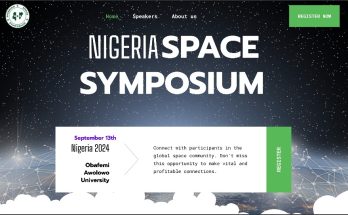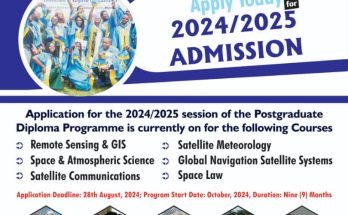
Prof Babatunde Rabiu, Director, UN-ARCSSTE-E, and Prof He Xiaochun, Georgia State University, with the cosmic ray muon detector
Prof. Babatunde Rabiu, the Director of the UN African Regional Centre for Space Science and Technology Education in English (UN-ARCSSTEE), a research and development centre of NASRDA, shared these insights during a symposium in Abuja on Friday. The symposium, focusing on Cosmic Rays and Space Weather, was organized by UN-ARCSSTEE in collaboration with Georgia State University (GSU), USA.
The muon detector for monitoring cosmic rays and space weather was designed and developed by the Physics and Astronomy Department of Georgia State University (GSU), USA.
Prof. Babatunde Rabiu explained that cosmic rays constitute natural radiation un-ionized in the atmosphere. He noted their variance in location, latitude, and altitude, which can undergo modification due to certain human activities.
He stressed the growing interest among scientists in predicting weather and studying space weather, especially given the evident climate change scenario, asserting that cosmic rays are omnipresent and pertinent to Earth’s climate study, though their full impact remains a subject of ongoing research.
Addressing space weather activities in Africa, Prof. Babatunde Rabiu traced their origins back to 2004 with the distribution of manometers across Africa by donor agencies. While acknowledging the presence of Global Navigation Satellite System (GNSS) receivers in a few African countries, he emphasized the continent’s need for more monitoring systems for space weather.

The muon detector for monitoring cosmic rays and space weather was built and designed by the Physics and Astronomy Department of Georgia State University (GSU), USA
Prof. He Xiaochun, the Director of Physics at GSU, USA, underscored the project’s aim to explore living conditions in space, understand adaptation, and provide stakeholders with information for informed decisions and protection.
Xiaochun described that cosmic ray radiation, predominantly consisting of proton particles, originates deep in space, enters the solar system, and produces cosmic ray showers in the earth’s upper atmosphere. The particles from these showers are measured at the earth’s surface to decode space and earth weather conditions.
Dr. Bonaventure Okere, the Director of the Centre for Basic Space Science and Astronomy, highlighted the facility’s significance in advancing astronomy studies and fostering research and development in the field.
The symposium delved into cosmic radiation’s interaction with the atmosphere and environments, its impact on climate change, and the utilization of cosmic rays muon detector for study and analysis. It also advocated for stakeholders to make informed decisions concerning gas emissions reduction and the promotion of clean air for sustainable human development.
This was reported by News Agency of Nigeria (NAN), Pulse Nigeria, Realnews Magazine and Worldstage News




